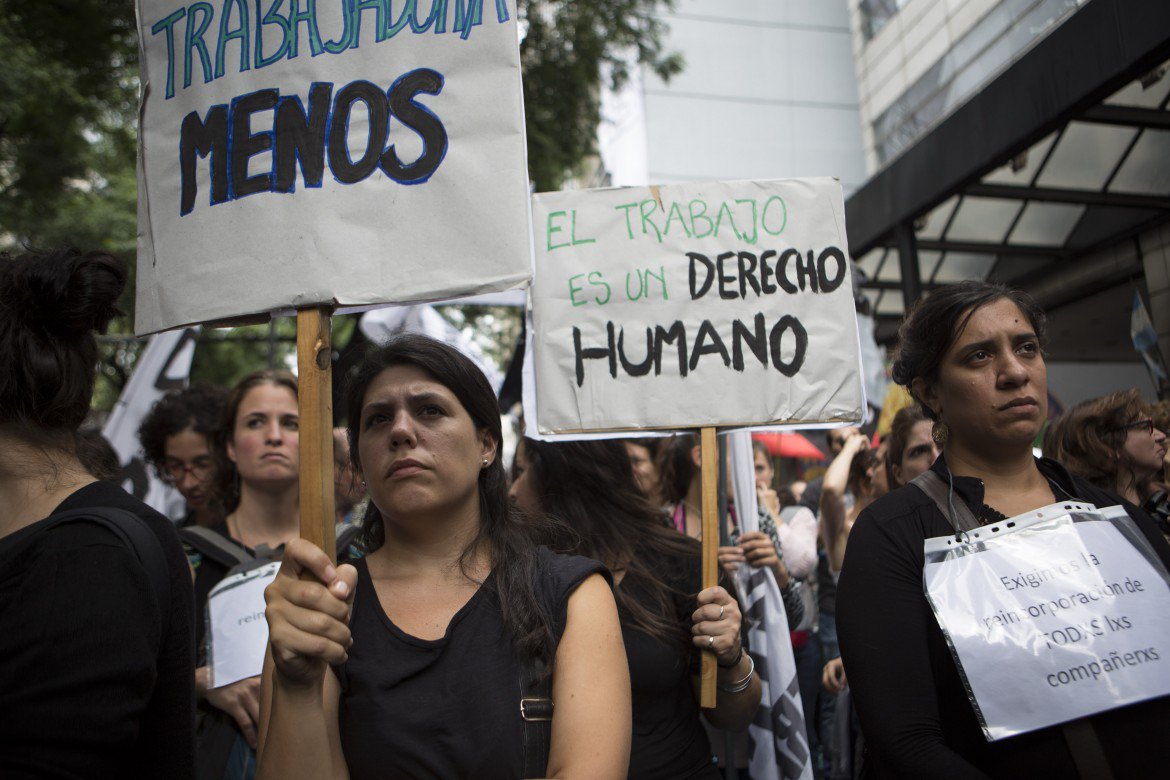Reportage
Argentine women strike against femicide
After the murder of a 16-year-old girl, women in Argentina stopped what they were doing and went into the streets for one hour.

Argentine women marched Wednesday in mourning to protest against femicide in what’s been called the “Argentine Black Wednesday.” First, from 1 p.m. to 2 p.m., feminists went on a historic strike, the first of its kind in Argentina, abstaining from any activity.
In the days leading up to the strike, organizers had urged women to join them: “In your office, your school, your court, your editing, your business or factory in which you’re working, stop for an hour to put a stop to sexist violence, because we all want to live.”
The number of femicides in Argentina is increasing at a worrying rate: 19 cases in the last 18 days. That’s one every 23 hours. The most recent, that of 16-year-old Lucia Perez, has shaken public opinion, placing the issue of violence against women in the spotlight.
The girl was drugged, raped and stabbed to death in the tourist area of Mar del Plata. “Inhumane sexual aggression” is what the magistrate Isabel Sanchez called the case. Two men, ages 23 and 41, were arrested. On Wednesday, Perez’s brother wrote a moving public letter, and their mother joined the demonstration “because there is no other Lucie.”
The #NiUnaMenos (“not one less”) campaign was launched in March 2015 the day after Daiana Garcia, 19, was found dead, half-naked under a bridge. She had been raped and suffocated with a sock.
The idea of women’s strike was born in Iceland on Oct. 24, 1975, when 90 percent of Icelandic women refrained from all activity for an hour. And recently the style of protest was repeated in Poland. Participation was high on Wednesday, and angry protesters joined in other countries as well: Bolivia, Venezuela, Uruguay, Honduras, Colombia. And in Mexico, following killings in Ciudad Juarez, officials acknowledged the legal concept of femicide. Solidarity also came from Italian, Spanish, French and German feminists.
“Like all of you, comrades, I want the women of my country to live,” former Argentine President Cristina Kirchner wrote on Facebook, inviting people to participate in the strike. March “for all those women who, like Milagro Sala, struggled to give name and rights to those who had none before,” she said.
Congresswoman Milagro Sala, of indigenous descent, has been in prison since last December on charges of embezzling public funds in the construction of self-managed social housing. Sala, who is part of the indigenous organization Tupac Amaru and the Central de los Trabajadores Argentinos (CTA), has always denied the charges and denounced the political maneuvers of the right-wing governor Gerardo Morales. She has also gained an ally in Pope Francis, who got to know her during a meeting with popular organizations at the Vatican, and who sent a rosary to her in prison.
The CTA has joined the strike along with other trade union organizations, increasingly agitated by the massive layoffs, raising tariffs, privatization and the shutting down of free information by neoliberal president Mauricio Macri.
Ten days ago, in the city of Rosario, a large demonstration of women at the end of a national meeting was brutally dispersed by police. Over 30 people were injured, including journalists.
“I want to live, and in all political and social areas, in science and culture, in every space that brings our society toward a more just and egalitarian place, in justice and in hospitals. In the schools and in the street,” Kirchner wrote.
Originally published at http://ilmanifesto.info/sciopero-delle-donne-contro-il-femminicidio/ on 2016-10-20
